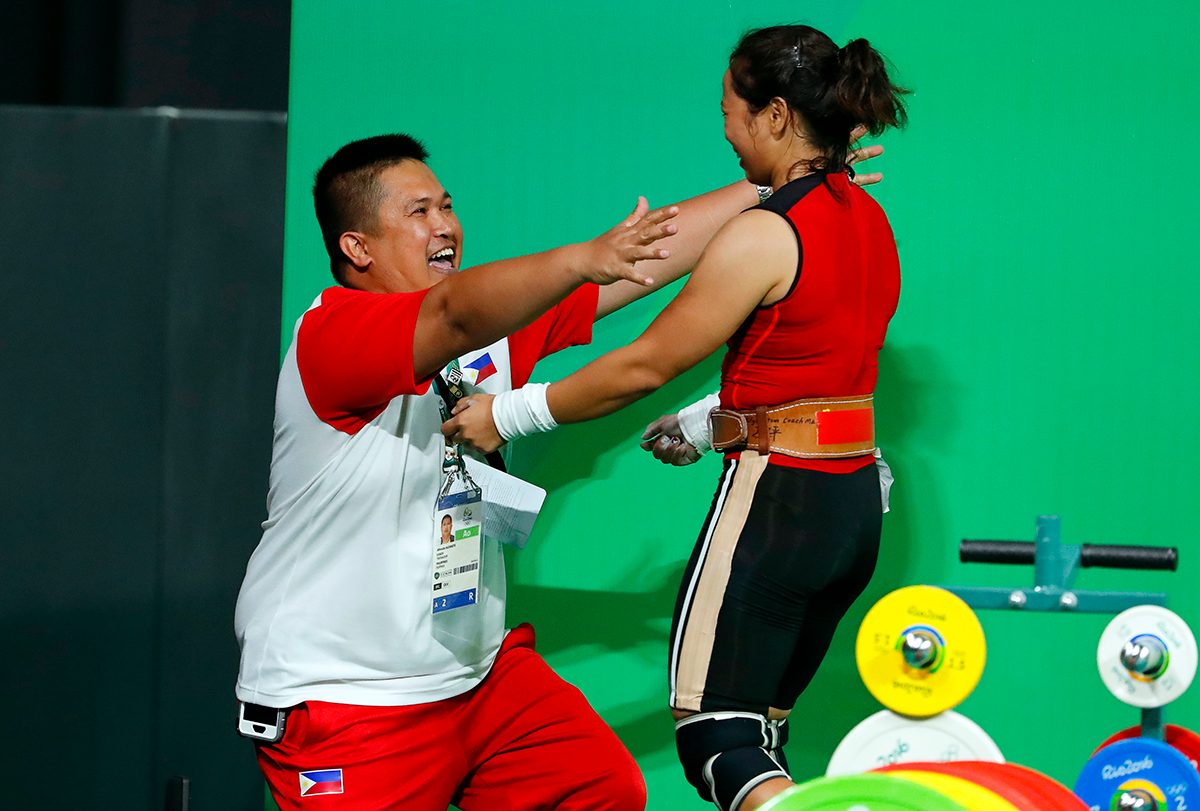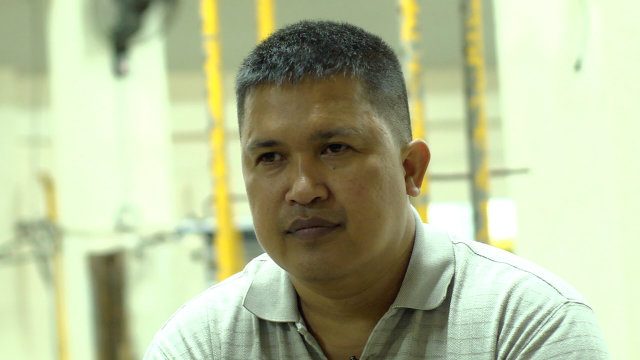SUMMARY
This is AI generated summarization, which may have errors. For context, always refer to the full article.

MANILA, Philippines – Filipino weightlifters Hidilyn Diaz and Nestor Colonia competed in the Rio Olympics Sunday, August 7 (Monday morning, August 8 in Manila) with only one man behind them, the same one who helped Diaz win a silver, the nation’s first Olympic medal since 1996.
His name is Alfonsito Aldanete, a burly but soft-spoken 43-year-old man who once wore the Philippine colors as well before settling in as a coach for the national weightlifting team.
Wearing casual clothes, he stands in the shadows during training, watching his two wards go through a planned routine – one they already decided on for the entire week. He doesn’t interrupt them except to offer a piece of advice here and there.
(READ: Rio 2016: Hidilyn Diaz)
Aldanete, a Zamboanga City native like Diaz and Colonia, got into weightlifting at 13 years old and only because circumstances forced him to explore his options.
“Dahil sa kahirapan ng buhay may nagbigay sa amin ng scholarship doon sa probinsya namin (Because we were poor we were given a scholarship at our province),” he shared. He studied at the Zamboanga Arturo Eustaquio College, now named Universidad de Zamboanga.
But before he let weightlifting change his life, Aldanete’s first love was boxing.
The young Aldanete grew up loving boxing by the influence of his father, whom he says is a frustrated boxer.
“He loved sports so we, his children, also grew up to love sports,” Aldanete said in Filipino.
Aldanete trained for boxing as a child, but the sport did not offer scholarships in schools at the time, he said. The coach recalled how every examination day, when tuition fees were due, he would always hand over a promisory note to his teacher.
That was when he finally considered weightlifting, a sport that offered scholarships.
“I asked my coach if I could do weightlifting, he told me I could because I was big enough,” Aldanete recalled.
He never looked back since.
A life in weightlifting
Just 3 years after he first began lifting weights, the 16-year-old Aldanete caught his first break with the national team. He flew to Manila then for the summer but when he went back home, he was off the team.
“No school was offering scholarships in Manila at the time,” Aldanete explained. “So I had to go home because what will I do about my studies?”
To this day, weightlifting scholarships are available largely in provinces. Only the University of the East offers a weightlifting scholarship in Manila, according to Aldanete.
He first dabbled into coaching in 2003 as a playing coach with the Navy. He retired as an athlete in 2005 after his last Southeast Asian Games in Manila and in 2006 became a full-time coach with the Philippine Navy.
He went to a Naval school in Zambales to study for a year and when he left he was recruited to the national team to pass down his talents.
“They gave me a break and sent me to seminars abroad for coaching,” he shared.
Aldanete traveled to Thailand, Texas, Qatar, and China for those seminars, learning some more and honing what he already knew.
As an assistant coach, he joined Diaz in the 2008 Youth Asian Championship in Korea, and then the Junior World Championship with both Diaz and Colonia, where Diaz nabbed a bronze medal.
He was also with Diaz in Myanmar for the 2013 Southeast Asian Games and in Singapore for the 2015 edition, where Diaz was a gold medalist.
2015 was a good year, Aldanete said. He was officially promoted to head coach to start that year and he helped Diaz and Colonia to gold medals in the Asian Weightlifting Championships in Thailand. And finally at the World Weightlifting Championships that year in Houston, Texas, Diaz and Colonia took home bronzes.
(READ: Rio 2016: Nestor Colonia)
Aldanete prides himself in testing his athletes and encouraging them to stretch their limits.
“Since I became coach I’ve been pushing our athletes,” he explained. “Before, they thought being in the national team means you’re good and you could relax. But I saw that when we push our athletes some more, we have a real shot in international competitions.”

Dreams for the future
Aldanete has long believed in Filipinos’ potential in weightlifting, saying strong determination is the key to success. That, on top of sufficient financial support, especially from the private sector.
“Nakikita ko maganda e,” he said. “May bright future sila sa weightlifting.” (I think it’s good. The future is bright in weightlifting.)
Aldanete is very much involved in the recruitment program throughout the provinces, where he has 12 scouts scattered among the regions. They search potential weightlifters to train and develop among the youth.
Aldanete tried training his own daughter, second of his 5 kids, when she was just 13 years old. She was good, he said, but she lacked interest in the sport. His daughter’s weightlifting stint lasted only 3 months.
“Ayoko puwersahin baka mamaya sa huli ako yung sisisihin niya,” he said. (I don’t want to force her, she might blame me in the end.)
When Aldanete tries to imagine a future for Philippine weightlifting, he sees the following: fully supported lifters, a stable and sustainable program that continuously develops athletes, focused and committed weightlifters and coaches who won’t have to worry about maintaining a day job to get by, and, finally, the Philippines as a true weightlifting leader.
(RELATED: IN PHOTOS: Silver medalist Hidilyn Diaz’s historic Olympic moment)
These are dilemmas the sport faces at present. Colonia and Diaz are members of the Air Force while Aldanete was with the Navy. All of whom have the same reasons for joining the Armed Forces: they need stable income to sustain their families.
After Diaz’s Rio success the weightlifting program is expecting a bit of a jolt. With Diaz considering retirement, Colonia, who fell short of an Olympic medal in the men’s 56-kg, will likely benefit from it as he looks ahead to bouncing back at the Tokyo Games by 2020.
Aldanete, the lone man who handled two weightlifters at Rio this year and had only Diaz by his side to help out Colonia when he was competing, longs for the good old days of Philippine weightlifting around 5 decades ago.
He heard stories about Salvador del Rosario, a Filipino world weightlifting gold medalist in the 70s and an Olympian.
There was also Salvador’s uncle, the late Rodrigo del Rosario, who was the first to represent the Philippines in Olympic weightlifting in 1948, and then in the 1952 and 1956 Games as well. There was Arturo del Rosario, Rodrigo’s son, who was a two-time Weightlifting Olympian in 1972 and 1976.
But Aldanete also longs for the future, when the weightlifting program is finally given a lift. – Rappler.com
Add a comment
How does this make you feel?
There are no comments yet. Add your comment to start the conversation.